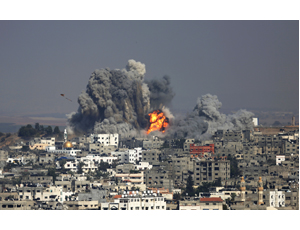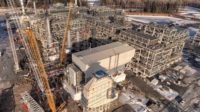

The Israeli military operation launched on July 8 in the Gaza Strip to stop Palestinian militants' rocket attacks is taking a toll on infrastructure and construction operations on both sides, particularly as fighting intensified at month's end after a month of on-and-off cease-fires.
Israeli shelling of nearby fuel tanks on July 29 knocked out Gaza's only power plant, which supplies two-thirds of electricity to Hamas-controlled Gaza City and nearby areas, according to a Reuters report. An energy ministry official said damage reports indicate the plant, which serves an estimated 1.8 million people, could be out of operation for one year.
A group of 12 Israeli-based and other human-rights organizations had urged Israel Defense Minister Moshe Ya'alon in a July 23 letter to take steps to repair and protect water and power infrastructure in Gaza.
"During the hostilities, the already fragile infrastructure sustained damage and can no longer supply the basic needs of the population," says the letter. The groups say damage to six of the 10 high-tension lines from Israel has already cut power flow to Gaza from Israel Electric Corp., leaving users with only two to five hours of electricity a day.
According to the groups' letter, the power shortage also has slowed pumping capacity for Gaza's water and wastewater treatment plants. In addition, they claim, three water utlity technicians were killed in the fighting.
Say the groups, "At present, 80 million liters of untreated sewage flow directly into the [Mediterranean] sea every day, and a third of Gaza's water wells are not functioning because technicians cannot access them, and the remaining wells are working between six to eight hours per day due to lack of electricity."
The groups want Israel to protect utility technicians and allow safe entry of fuel and essential supplies into Gaza.
The hostilities, which have killed more than 1,100 Palestinians and 56 Israelis, also have brought construction in southern Israel to a virtual halt.
Work has stopped at the expansion of the natural-gas receiving terminal at Ashdod, about 25 miles from Gaza City. Ashdod has been a target of dozens of rockets fired from the Gaza Strip.
The project involves extensive outside work to increase the capacity of the terminal, which supplies the domestic market with gas from the huge Tamar offshore field.
In a July 24 call with investors and analysts to announce the firm's second-quarter earnings, Charles D. Davidson, CEO of U.S.-based Noble Energy Inc., which manages the field's production, said "facilities are well protected, and they remain unaffected." However, he said the firm will "slightly reduce our estimates for near-term sales volumes there due to the situation."
Eli Avisror, CEO of Avisror Moshe & Sons, a large residential builder based in Beersheva, says, “Only about 25% of our workers are showing up, and, when sirens sound, they run off and leave the sites.”
He adds that the situation is worse on infrastructure projects, as workers are not prepared to work out in the open under such tense conditions.
About half the construction workers in Israel are from the West Bank, with the being rest Israeli citizens or foreign, primarily from China.
“Many of the workers from the West Bank are finding it difficult to make it to the building sites, and this is also having an impact on projects in central and even northern Israel,” says Shay Pauzner, deputy director of the Association of Contractors and Builders in Israel. The group is demanding the government grant automatic extensions on the timetable for completion of work due to the security situation.
Pauzner also cited the call-up of reserve military forces, which has left many Israeli engineering firms and contractors missing key project management personnel.
“The two engineers heading the expansion of Highway 71 in northern Israel have been mobilized, and this has led to a freeze in the work,” says Yehuda Dugach, design manager for infrastructure projects at Danya Cebus Ltd., one of the country’s leading construction and development companies.
At least 35 to 40 company managers have been called up, say company executives.
The highway runs from Afula to Bet Shean and to the Sheikh Hussein Bridge on the border with Jordan. In the past year, the two-lane roadway has been used increasingly for shipping goods from Turkey to Jordan and beyond, instead of through Syria.
For the most part, the situation has not affected another major project, the expansion of Highway 1 between Tel Aviv and Jerusalem. “The first time I heard a siren it was strange, but it has been relatively quiet in the past week,” says Jindrich Potucek, a bridge designer at Finley Engineering Group Inc., the Tallahassee, Fla., firm that is providing segmental bridge design and construction engineering services for the Motsa bridge, which is part of the Highway 1 upgrade.
However, the fighting has not held up the procurement to operate two $1-billion ports to be built in Ashdod and Haifa. The Israel Ports Development and Assets Co. Ltd. said July 27 that four companies had passed the pre-qualifying stage: Dutch based TIL Group; Germany’s Eurogate Group; ICTSI of the Philippines; and China’s Shanghai International Port Group. Final bids will be submitted by November and a decision is set to be made in early 2015.
Meanwhile, the Israel Defense Ministry is mulling an Israeli technology firm's proposal to detect the network of Hamas tunnels built in the Gaza Strip into Israel.
Magna BSP has proposed construction of a 70 km tunnel along the Israel-Gaza border that would feature the firm's advanced electro-optic passive radar system and sensors.
Firm founder and CEO Haim Siboni said the technology now is in use at above-ground installations in Israel, Singapore, Mexico, Russia and South Africa and would only need slight modifications to work in an underground setting.






Post a comment to this article
Report Abusive Comment